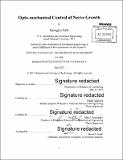Opto-mechanical control of nerve growth
Author(s)
Park, Seongjun
DownloadFull printable version (7.740Mb)
Other Contributors
Massachusetts Institute of Technology. Department of Mechanical Engineering.
Advisor
Polina Anikeeva and Alan. J. Grodzinsky.
Terms of use
Metadata
Show full item recordAbstract
A variety of biochemical and biophysical cues have been investigated with the goal of promoting regenerative ability of peripheral nerves. Among those neurotrophic factors, topography, and electrical stimulation have been proposed to enhance nerve growth. This thesis explores optogenetic neural stimulation as a means to control neurite growth that promises greater cell-type specificity than commonly used electrical stimulation. Using dorsal root ganglia (DRGs) expressing channelrhodopsin 2 (ChR2) as a test system, I have investigated a broad range of optical stimulation parameters and identified conditions that enhance neurite outgrowth by three-fold as compared to unstimulated controls or wild-type DRGs lacking ChR2. I have also found that optogenetic stimulation of ChR2 expressing DRGs induces directional outgrowth in WT DRGs co-cultured within a 10 mm vicinity of the optically sensitive ganglia. The observed directional increase of neurite growth was correlated to an increased expression of neural growth and brain derived neurotrophic factors (NGF, BDNF). Finally, experiments performed with DRGs seeded within the mechanical guidance channels showed that simultaneous optical and topographic stimulation act synergistically to increase nerve regeneration rate. This thesis illustrates the potential of optogenetics as a tool to study and control growth in specific nerve populations.
Description
Thesis: S.M., Massachusetts Institute of Technology, Department of Mechanical Engineering, 2015. Cataloged from PDF version of thesis. Includes bibliographical references (pages 45-47).
Date issued
2015Department
Massachusetts Institute of Technology. Department of Mechanical EngineeringPublisher
Massachusetts Institute of Technology
Keywords
Mechanical Engineering.